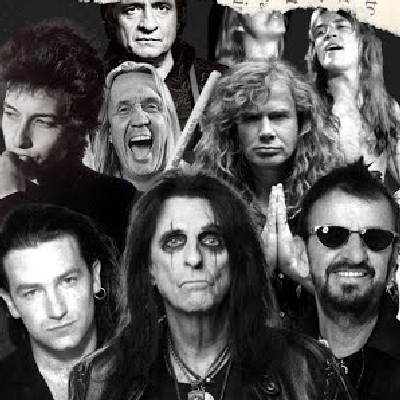Before glam rock became its own kind of religion, before metalheads pushed the limits of on-stage excess, before stadium shows sparked mass ecstasy, there was rebellion and a hunger for freedom. Rock and roll—synonymous with defying authority—rarely conjured humility or a search for spirituality. And yet, among those who shouted the loudest and lived the wildest, the noise often gave way to silence—and in that silence, a voice they hadn’t heard before. The voice of Jesus.
 Awakenings at the Edge of Collapse
Awakenings at the Edge of Collapse
Rock conversion stories are striking—not only because they feature wildly charismatic people, but because they’re authentic, raw, and full of contradictions. Morning after a show, when the lights are off and the crowd has gone home, many legends are left alone with a void no applause can drown out.
That void often marks the beginning of a new road—what some call “the greatest adventure of a lifetime.” Here are stories of artists who not only reached the heights of fame but, sometimes against all odds, found meaning and peace in faith.
Dave Mustaine – Metal, Fury, and Grace
Dave Mustaine is a living metal legend. As Megadeth’s founder, he embodied rebellion and extremity. Alcohol, drugs, conflict—everyday reality. He admits his life was heading for disaster:
The turning point was family—his wife and daughter encouraged him back to Christianity. He often adds:
Today he openly calls faith the foundation of his new life. He didn’t quit metal—if anything, he uses it to share a message of hope (Rolling Stone).
Brian “Head” Welch – From the Bottom to the Light
The Korn co-founder’s arc is one of destruction and redemption. Years of addiction and inner collapse led to a precipice—then, as he says, an encounter with Jesus changed everything.
In 2005 he was baptized in the Jordan and chose life with Christ. He later rejoined Korn, but as a different man.
Jonathan Cain – Relentless Searching
Journey’s keyboardist/guitarist seemed to have the American dream—yet felt empty. A chance church visit in Oklahoma became a turning point.
Since then his music has been steeped in spirituality:
Mark Farner – From “Some Kind of Wonderful” to “Come to Jesus”
Nicko McBrain – A Drummer on a Mission
Alice Cooper – The Dark Showman, Light Within
Dan Spitz – Metal and Messianic Faith
Kerry Livgren – Lyrics with a Soul
Bob Dylan – Gospel and Controversy
Lou Gramm – The Foreigner Voice and a New Life
Ringo Starr – Quiet Return in a Giant’s Shadow
Bono – U2’s Spiritual Voice
Johnny Cash – The Man in Black and Grace
Spiritual Transformation and Rock Music
What links these stories? A search for meaning. For many, the rebellious energy of rock eventually turned toward something greater. Faith didn’t limit them; it fueled creativity. The music grew deeper—less a scream, more a testimony.
Brian Welch puts it best:
Can You Be a Rocker and a Christian?
These legends answer: yes. God doesn’t demand the death of passion—He changes hearts. Their shows become spaces of hope. Many serve, give, teach, and encourage the young to seek meaning.
Summary
There are many roads to God. Some find Him at the bottom; others on the summit. The journeys of legendary rockers show faith isn’t only for the quiet and meek—it’s for those living full throttle. Rock and roll isn’t just rebellion; it’s also a search for light.
Recommended on EF
See our New Music section to follow the latest in Christian rock/metal.
FAQs
Do rock and Christianity clash?
No. For many artists, faith became strength and meaning, and music a vehicle for testimony—without losing rock’s energy.
Why do conversions often follow peak success?
After the rush of fame comes a reckoning with emptiness. That’s when the deepest questions about purpose arise.
Do artists change their style after conversion?
It varies. Some stay heavy, others soften. The common thread is transformed content and intention.
How do fans respond to spiritual themes live?
Usually positively—when it’s authentic. Many artists pray with fans after shows and offer support.



